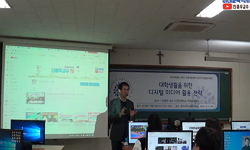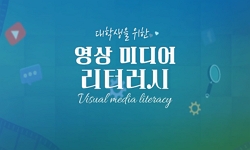목적 본 연구는 강점기반 진로교과가 대학생의 강점인식, 강점활용, 자아존중감 및 진로적응력에 미치는 효과를 검증하는 데 목적이 있다. 방법 이를 위하여 충청도 소재 4년제 대학의 강점...
http://chineseinput.net/에서 pinyin(병음)방식으로 중국어를 변환할 수 있습니다.
변환된 중국어를 복사하여 사용하시면 됩니다.
- 中文 을 입력하시려면 zhongwen을 입력하시고 space를누르시면됩니다.
- 北京 을 입력하시려면 beijing을 입력하시고 space를 누르시면 됩니다.

강점기반 진로교과가 대학생의 강점인식, 강점활용, 자아존중감, 진로적응력에 미치는 효과 = The Effects of Strength-based Career Course on Strength Knowledge, Strength Use, Self-Esteem, and Career Adaptability of College Students
한글로보기https://www.riss.kr/link?id=A107782014
- 저자
- 발행기관
- 학술지명
- 권호사항
-
발행연도
2021
-
작성언어
-
-
주제어
강점 ; 강점인식 ; 강점활용 ; 자아존중감 ; 진로적응력 ; 진로교육 ; 진로교과 ; 대학생 ; strength ; strength knowledge ; strength use ; self-esteem ; career adaptability ; career education
-
KDC
373
-
등재정보
KCI등재
-
자료형태
학술저널
-
수록면
247-262(16쪽)
-
KCI 피인용횟수
0
- 제공처
-
0
상세조회 -
0
다운로드
부가정보
국문 초록 (Abstract)
목적 본 연구는 강점기반 진로교과가 대학생의 강점인식, 강점활용, 자아존중감 및 진로적응력에 미치는 효과를 검증하는 데 목적이 있다. 방법 이를 위하여 충청도 소재 4년제 대학의 강점기반 진로교과를 수강한 실험집단 125명, 다른 내용으로 구성된 진로교과를 수강한 통제집단 108명을 대상으로 강점인식, 강점활용, 자아존중감 및 진로적응력 수준을 사전과 사후에 각각 측정하고 집단 간 효과차이를 분석하였다. 결과 실험집단과 통제집단의 사전검사 점수를 통제한 후, 사후검사 점수의 차이를 분석한 결과 강점기반 진로교과를 수강한 학생들의 강점인식, 강점활용, 자아존중감, 진로적응력 모두 유의미하게 증가하는 모습을 보였다. 결론 이러한 결과는 강점기반 진로교과를 통해 대학생들이 강점을 인식하고, 인식한 강점을 활용하는 것뿐 아니라, 자신에 대한 긍정적인 평가, 더 나아가 진로적응력 역시 향상될 수 있음을 시사한다.
다국어 초록 (Multilingual Abstract)
Objectives The purposes of this study were to examine the effects of strength-based career courses for College students on strength knowledge, strength use, self-esteem, and career adaptability. Methods For this study, the level of strength knowledge,...
Objectives The purposes of this study were to examine the effects of strength-based career courses for College students on strength knowledge, strength use, self-esteem, and career adaptability. Methods For this study, the level of strength knowledge, strength use, self-esteem, and career adaptability were measured before and after the experimental group 125 students who took strength-based career course and the control group 108 students who took other career course consisting of different contents. And the difference in effect between groups was analyzed. Results After controlling the pre-test scores of the experimental group and the control group, as a result of analyzing the difference between the post-test scores, significant differences were found between groups in strength knowledge, strength use, self-esteem, and career adaptability. Conclusions These results suggest that it can be improved not only for college students to recognize their strengths through strength-based career courses, and to use the recognized strengths, but also to give positive evaluations of themselves and career adaptability which is a form of adaptation in a rapidly changing environment. This study is meaningful in that by developing a strength-based career course linking strengths and career paths, it provided verified data for enhancing college students strengths awareness and use of strengths, self-esteem, and career adaptability.
목차 (Table of Contents)
- Ⅰ. 서론 Ⅱ. 이론적 배경 Ⅲ. 연구 방법 Ⅳ. 연구 결과 Ⅴ. 결론 및 논의
- Ⅰ. 서론 Ⅱ. 이론적 배경 Ⅲ. 연구 방법 Ⅳ. 연구 결과 Ⅴ. 결론 및 논의
참고문헌 (Reference)
1 김영빈, "학습부진 중학생의 자아개념 향상과 학교적응을 위한 강점발견 프로그램 개발 및 효과성 검증" 사범대학부속중등교육연구소 60 (60): 805-841, 2012
2 서우석, "포트폴리오형 진로개발프로그램이 교육대학생의 진로준비행동 및 진로성숙도에 미치는 효과" 한국실과교육연구학회 23 (23): 187-206, 2017
3 박미진, "취업준비 대학생의 스트레스에 대한 질적 연구" 한국상담학회 10 (10): 417-435, 2009
4 이현주, "초등학생의 주관적 안녕감 증진을 위한 강점 기반 집단상담 프로그램 개발" 한국상담학회 12 (12): 467-488, 2011
5 임인선, "초등학생의 성격강점 지각이 주관적 행복감과 진로의식성숙에 미치는 영향" 서울교육대학교 교육대학원 2014
6 김기년, "청소년의 삶의 만족증진을 위한 강점코칭프로그램의 효과" 한국심리학회산하학교심리학회 15 (15): 331-360, 2018
7 김수림, "청소년의 강점인식과 진로결정자기효능감의 관계 : 강점활용의 매개효과" 광운대학교 대학원 2014
8 이형국, "인지적 정보처리접근 중심 대학생 진로발달 증진 프로그램 개발" 한국상담학회 11 (11): 701-720, 2010
9 Lopez, S. J., "인간의 강점 발견하기" 학지사 2011
10 황해익, "유아교사용 강점 척도 개발 및 타당화 연구" 학습자중심교과교육학회 19 (19): 847-876, 2019
1 김영빈, "학습부진 중학생의 자아개념 향상과 학교적응을 위한 강점발견 프로그램 개발 및 효과성 검증" 사범대학부속중등교육연구소 60 (60): 805-841, 2012
2 서우석, "포트폴리오형 진로개발프로그램이 교육대학생의 진로준비행동 및 진로성숙도에 미치는 효과" 한국실과교육연구학회 23 (23): 187-206, 2017
3 박미진, "취업준비 대학생의 스트레스에 대한 질적 연구" 한국상담학회 10 (10): 417-435, 2009
4 이현주, "초등학생의 주관적 안녕감 증진을 위한 강점 기반 집단상담 프로그램 개발" 한국상담학회 12 (12): 467-488, 2011
5 임인선, "초등학생의 성격강점 지각이 주관적 행복감과 진로의식성숙에 미치는 영향" 서울교육대학교 교육대학원 2014
6 김기년, "청소년의 삶의 만족증진을 위한 강점코칭프로그램의 효과" 한국심리학회산하학교심리학회 15 (15): 331-360, 2018
7 김수림, "청소년의 강점인식과 진로결정자기효능감의 관계 : 강점활용의 매개효과" 광운대학교 대학원 2014
8 이형국, "인지적 정보처리접근 중심 대학생 진로발달 증진 프로그램 개발" 한국상담학회 11 (11): 701-720, 2010
9 Lopez, S. J., "인간의 강점 발견하기" 학지사 2011
10 황해익, "유아교사용 강점 척도 개발 및 타당화 연구" 학습자중심교과교육학회 19 (19): 847-876, 2019
11 이상화, "여성노인을 위한 강점중심 탄력성 증진 프로그램 효과" 한국자료분석학회 21 (21): 463-477, 2019
12 박미선, "아동·청소년을 위한 성격대표강점 활용 집단 프로그램 개발: 임상군을 위한 예비연구" 한국발달지원학회 8 (8): 107-122, 2019
13 김종운, "성격강점 기반 행복증진프로그램이 양육미혼모의 회복탄력성과 특성불안 및 자기효능감에 미치는 효과" 학습자중심교과교육학회 18 (18): 515-537, 2018
14 백유미, "성격강점 관련 연구 동향 분석" 학습자중심교과교육학회 20 (20): 1009-1029, 2020
15 이영대, "생애단계별진로교육의 목표와 내용 체계 수립" 한국직업능력개발원 2004
16 남현우, "마음챙김 활용 성격강점 증진 프로그램이 아동의 회복탄력성에 미치는 효과" 한국청소년상담복지개발원 23 (23): 105-134, 2015
17 정지은, "대학생의 진로적응성과 사회적 지지, 자아존중감 및 자기주도학습의 인과적 관계" 한국농·산업교육학회 47 (47): 79-96, 2015
18 조영아, "대학생의 진로적응력과 자기수용, 강점인식, 강점활용의 구조적 관계" 한국농·산업교육학회 50 (50): 127-149, 2018
19 류지은, "대학생의 진로의사결정 과정에서의 불확실성 대응에 관한 메타분석: 불확실성에 대한 인내력 부족과 계획된 우연 기술을 중심으로" 한국농·산업교육학회 51 (51): 73-100, 2019
20 김영희, "대학생의 지각된 스트레스와 심리적 안녕감 간의 관계: 성격강점과 강점활용의 매개효과" 한국청소년상담복지개발원 25 (25): 177-196, 2017
21 서지영, "대학생의 수치심이 진로성숙도에 미치는 영향 : 강점인식을 상호작용변인으로" 한양대학교 교육대학원 2014
22 김민정, "대학생의 강점인식이 진로성숙도에 미치는 영향: 강점활용과 진로결정자기효능감의 매개효과" 한국상담학회 15 (15): 1811-1830, 2014
23 이재은, "대학생의 강점인식과 진로준비행동의 관계: 진로결정자기효능감의 매개효과" 한국농·산업교육학회 49 (49): 113-132, 2017
24 이지원, "대학생의 강점인식과 대학생활적응의 관계: 강점활용과 진로정체감의 매개효과" 한국상담학회 18 (18): 205-228, 2017
25 심명석, "대학생들의 행복증진을 위한 성격강점 프로그램의 효과검증" 사회과학연구소 28 (28): 269-283, 2017
26 김수란, "대학생 대상 진로교육 교과목이 진로장벽, 진로결정, 진로준비행동, 진로결정 자기효능감에 미치는 효과" 한국교육방법학회 26 (26): 409-433, 2014
27 조영아, "대기업 사무직 근로자의 경력관리행동과 핵심자기평가, 지각된 규범, 결과기대 및 실행의지의 구조적 관계" 서울대학교 대학원 2015
28 구본형, "내 안의 강점발견법 : 나는 무엇을 잘할 수 있는가" 고즈원 2002
29 조지연, "긍정심리기반 강점 코칭 프로그램이 대학생들의 자기효능감, 진로의사결정 및 진로결정수준에 미치는 영향" 한국청소년학회 23 (23): 279-304, 2016
30 이정희, "관광전공 대학생의 성격강점과 진로적응성의 관계에서 강점활용의 매개효과" 동북아관광학회 12 (12): 249-268, 2016
31 최경화, "경력단절여성 대상 강점 중심 그룹코칭 프로그램이 자존감, 구직효능감, 회복탄력성에 미치는 영향" 한국코칭심리학회 1 (1): 73-97, 2017
32 선혜영, "강점코칭프로그램이 직장인의 강점자기효능감, 긍정정서, 자기효능감, 직무열의와 조직몰입에 미치는 영향" 한국산업및조직심리학회 30 (30): 221-246, 2017
33 박정임, "강점중심 집단프로그램의 효과성에 관한 메타분석연구" 한국콘텐츠학회 16 (16): 530-538, 2016
34 조남근, "강점인식이 심리적 안녕감과 진로적응성에 미치는 영향: 강점활용과 자기효능감의 매개효과" 한국청소년학회 23 (23): 1-27, 2016
35 김혜경, "강점인식이 강점활용에 미치는 영향 : 긍정정서와 희망의 매개효과 중심으로" 가톨릭대학교 대학원 2016
36 이예종, "강점노트 프로그램이 융복합시대 대학생의 정신건강에 미치는 영향" 한국디지털정책학회 13 (13): 223-228, 2015
37 신현정, "강점 키우기를 통한 유아의 인성역량 함양 프로그램 개발 및 효과" 한국어린이미디어학회 18 (18): 161-186, 2019
38 Linley, P. A., "Using signature strengths in pursuit of goals : Effects on goal progress, need satisfaction, and well-being, and implications for coaching psychologists" 5 (5): 6-15, 2010
39 Super, D. E., "The psychology of careers" Harper 1957
40 Buhr, K., "The intolerance of uncertainty scale : Psychometric properties of the English version" 40 (40): 931-945, 2002
41 Lopez, S. J., "The Principles of Strengths-Based Education" 5 (5): 1-8, 2009
42 Savickas, M. L., "The Career Adaptabilities Scale : Construction, reliability, and measurement equivalence across 13 countries" 80 : 661-673, 2012
43 Gustafson, K., "Survey of Instructional Development Models" Clearinghouse of Instructional Technology, Syracuse University 2002
44 Rath, T., "StrengthsFinders, 2. 0" Gallup Press 2007
45 Govindji, R., "Strengths use, self-concordance and well-being : Implications for strengths coaching and coaching psychologists" 2 (2): 143-153, 2007
46 Clifton, D. O., "Strengths Quest : Discover and develop your strengths in academics, career, and beyond" The Gallup Press 2002
47 Rosenberg, M., "Society and the adolescent self-image" Princeton. University Press 1965
48 Seligman, M. E. P., "Positive psychology progress : Empirical validation of interventions" 60 : 410-421, 2005
49 Seligman, M. E. P., "Positive Psychology : An introduction" 55 : 5-14, 2000
50 Gecas, V., "Parental behavior and dimensions of adolescent self-evaluation" 34 (34): 466-482, 1971
51 Buckingham, M., "Now, Discover your strengths" The Free Press 2001
52 Eccles, J. C., "Motivational beliefs, values, and goals" 53 : 109-132, 2002
53 Porfeli, E., "Handbook of research on adult learning and development" Routledge 412-436, 2009
54 Harter, J. K., "Gage Park High School research study" The Gallup Organization 1998
55 Minhas, G., "Developing realised and unrealized strengths : Implications for engagement, self-esteem, life satisfaction and well-being" 2 : 12-16, 2010
56 Rosenberg, M., "Conceiving the self" Basic 1979
57 Peterson, C., "Character strengths and virtues: A classification and handbook" Oxford University Press/American Psychological Association 2004
58 Sampson, J. P., "Career counseling and services : A cognitive information processing approach" Thomson/Brooks/Cole 2004
59 Tak, J., "Career Adapt-abilities Scale—Korea Form : Psychometric properties and construct validity" 80 (80): 712-715, 2012
60 Linley, P. A., "Average to A+ : Realising strengths in yourself and others" CAPP Press 2008
61 Harter, S., "At the threshold: The developing adolescent" Harvard University Press 352-387, 1990
62 Van Vianen, A. E. M., "Adaptable Careers : Maximizing Less and Exploring More" 57 : 298-309, 2009
동일학술지(권/호) 다른 논문
-
Jigsaw모형과 PBL의 융합교육 효과 : 패션마케팅 교과목의 적용사례를 중심으로
- 학습자중심교과교육학회
- 채희주(Chae, Heeju)
- 2021
- KCI등재
-
Global Citizenship Education Redefined: Systematic Literature Review and Text Mining Analysis
- 학습자중심교과교육학회
- 박경희(Park, Kyunghee)
- 2021
- KCI등재
-
대학교육의 역량기반 수업컨설팅 연구 : K대학교의 역량기반 수업 일관성 분석 사례를 중심으로
- 학습자중심교과교육학회
- 김현경(Kim Hyun-Kyoung)
- 2021
- KCI등재
-
다층모형을 활용한 고등학생 진로교육 만족도에 영향을 미치는 요인 분석
- 학습자중심교과교육학회
- 이윤수(Yunsoo Lee)
- 2021
- KCI등재
분석정보
인용정보 인용지수 설명보기
학술지 이력
| 연월일 | 이력구분 | 이력상세 | 등재구분 |
|---|---|---|---|
| 2027 | 평가예정 | 재인증평가 신청대상 (재인증) | |
| 2021-01-01 | 평가 | 등재학술지 유지 (재인증) |  |
| 2018-01-01 | 평가 | 등재학술지 유지 (등재유지) |  |
| 2015-01-01 | 평가 | 등재학술지 유지 (등재유지) |  |
| 2011-01-01 | 평가 | 등재학술지 유지 (등재유지) |  |
| 2008-01-01 | 평가 | 등재학술지 선정 (등재후보2차) |  |
| 2007-01-01 | 평가 | 등재후보 1차 PASS (등재후보1차) |  |
| 2006-01-06 | 학술지명변경 | 외국어명 : Journal of Learner-Centered Curriculum and Instruction -> The Journal of Learner-Centered Curriculum and Instruction |  |
| 2006-01-01 | 평가 | 등재후보학술지 유지 (등재후보1차) |  |
| 2004-01-01 | 평가 | 등재후보학술지 선정 (신규평가) |  |
학술지 인용정보
| 기준연도 | WOS-KCI 통합IF(2년) | KCIF(2년) | KCIF(3년) |
|---|---|---|---|
| 2016 | 1.29 | 1.29 | 1.31 |
| KCIF(4년) | KCIF(5년) | 중심성지수(3년) | 즉시성지수 |
| 1.37 | 1.42 | 1.436 | 0.33 |




 스콜라
스콜라






